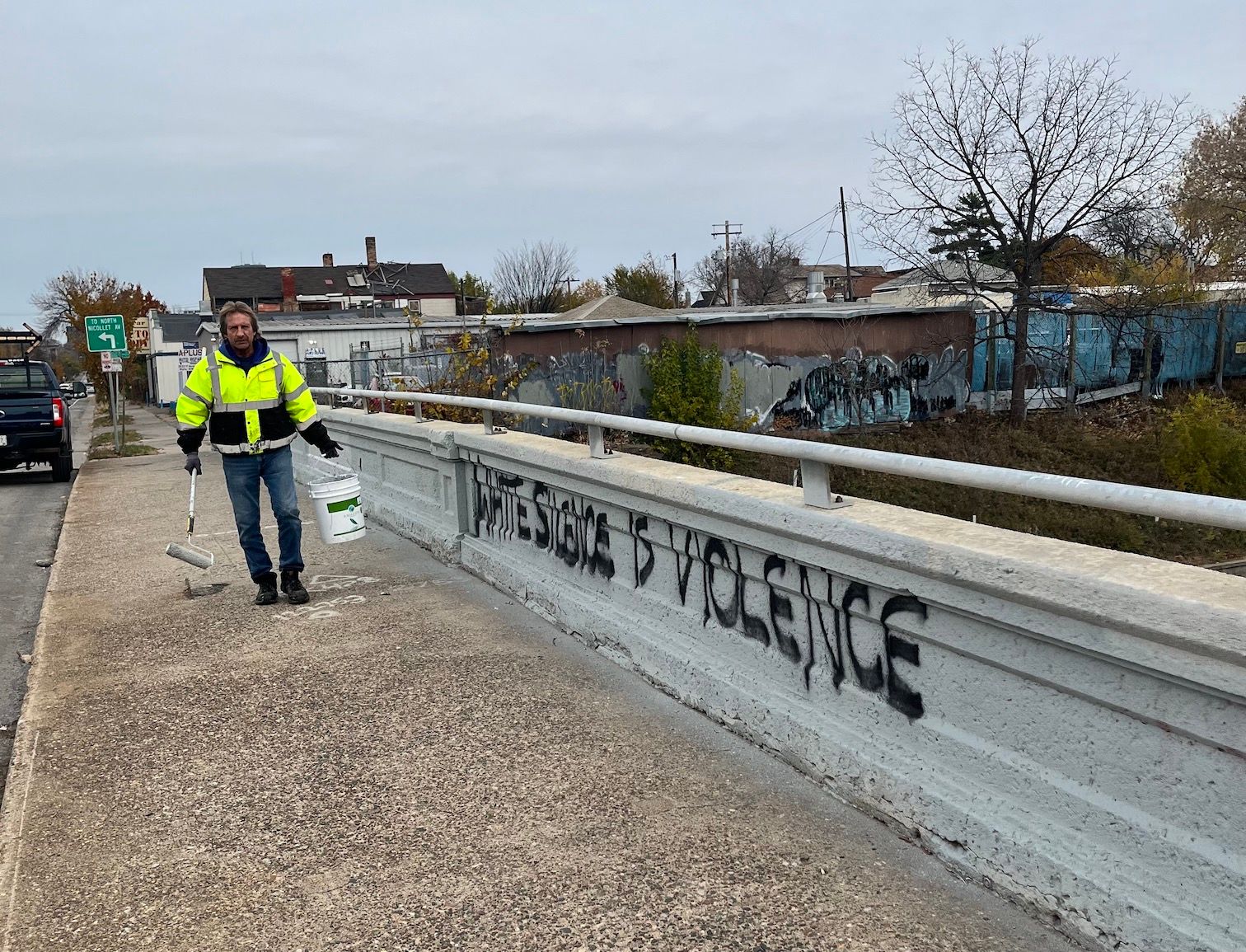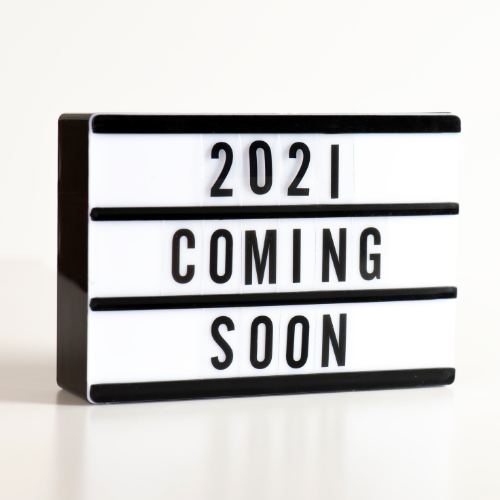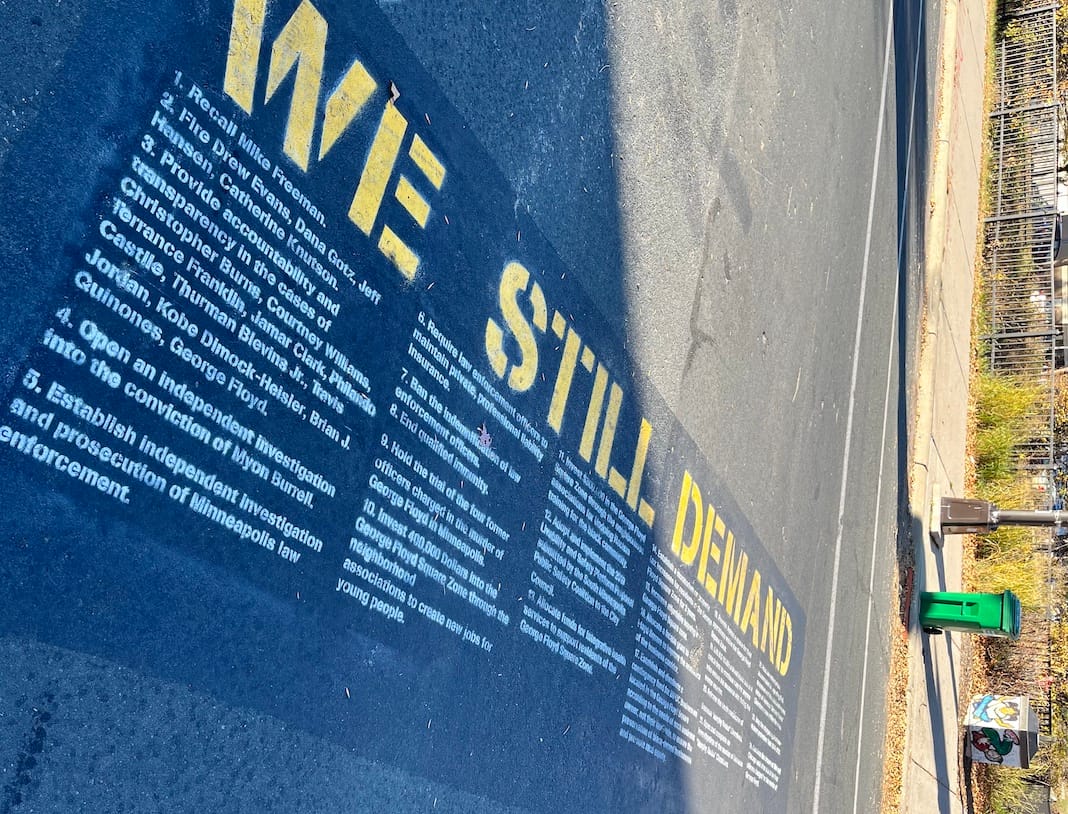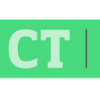Winter
The December publishing schedule forces recollection and comparison to what we still call "before times," although the phrase feels far less cheery two years into the pandemic. The desire to recollect and reflect on what I learned in 2021 irritates me. In the words of this year's teen pop ingenue, it's brutal out here.
In the before times, I probably wouldn't have guessed that I'd spend a day in 2021 wondering: How do I deliver keyword research in this client meeting when there is an insurrection in the nation's Capitol happening live?
Eventually, the power transition is smooth, the insurrection passes, and the new President is a man from where I grew up, a man I met when I was a child. Renewal, he promises, and invites all the right people to his inauguration ceremony.
Spring
In the before times, I never considered how I'd react if my state turned my neighborhood into an example. What happens when people focus their energy on protesting the ongoing, senseless police killings of Black men? What happens when people are outraged by the death of Daunte Wright, who was pulled over for expired tabs and an air freshener? Well, cops teargas protestors and people's homes in the nearby suburb where Wright was killed.
In my neighborhood the city erects preemptive layers of protective barbed wire outside the Fifth Precinct. The Minneapolis Police Department, with their massive amount of arms and giant percentage of the city budget, is snug inside, presumably chatting about hunting protestors.
After the protests conclude, I leave a voicemail for the mayor requesting that he take down the barbed wire to make my street look less like a prison camp. Some barbed wire is taken down, but plenty remains in December 2021, long after Derek Chauvin's murder conviction and Kim Potter's manslaughter conviction. There have not been large protests by the 5th precinct for more than a year, but the barbs remain.
In June a man named Winston Smith is killed by some amalgam law enforcement agency shrouded in layers of secrecy. The center of protests move from a mile east of my home, at George Floyd Square, to a mile west in Uptown, a shopping district gutted pre-pandemic by chain retail abandonment. Conspiracy theories bloom, a protestor named Deona Knadjek is killed when a motorist crashes into the barricades, a few protestors start talking about carrying guns, and I have to look away.
Outside, encampments for the unhoused grow. Every so often the city sweeps them away, and they reappear elsewhere. Fixing the unhoused problem takes coordination of resources on the city, county, state and federal level that, for some reason, we can't figure out. It's a complicated, complex problem that we're only starting to properly address, I hear. I wonder how much we spent on corralling protestors and teargas, and whether that came from city, county, state or federal taxes.
In the before times, I advised ignoring the comments section, but in 2021 I am just monitoring current events. I want to know where people are coming from, I tell myself. It's important to be exposed to dissenting opinions, so I can at least know what's going on and if the general public supports change. But the dissenting opinions are the same that I've heard since I was a child: we all have individual choice within the current system, which is fairly enforced by both corporations and the law-and-order state. If your needs aren't met, then you chose wrong.
On social networks and the newspaper comments section, homegrown racism is disguised as "discussion," "engagement" and "participation." It's easy to ignore—just don't click on the comments section, don't look at the negativity, don't go down the paths where you have no power—until it's not.
Summer
The contemporary American way of dealing with individual powerlessness is to throw yourself into your career. In between client work and learning more about how city governments operate, I remember that my company is called The Content Technologist. I'm supposed to be exploring new business models of content and championing the digital future, so let's see what's happened elsewhere while I was paying attention to my neighborhood.
Turns out that my freelance business is considered part of The Creator Economy now, or at least it could be. The blunt thrust of neoliberal hegemony presents me with NFTs and Web3, supported by investors and academics with names like Packy and Mat. Those lucky, plucky advocates with extra time to learn and excess money to burn!
The whole kerfuffle reminds me of Risky Business, but the product is hastily designed neon Beanie Babies instead of sex work, which makes it all extremely dorky and a bit boring. The content part certainly isn't worth my attention,* and the technology feels inaccessible to most.

In initial observations, I see a few women in the space, but mostly it looks like a frat party. Certainly not close to 50% women, which is what a truly inclusive technology would look like, considering the world's population. I don't like to join clubs where I'm fighting for basic inclusion. Where are the women? I wonder.
Oh yes, most women I know are fighting for keeping their families relatively healthy while also maintaining a full-time career because our country does not provide basic child care. Other women are preventing the erosion of well-established reproductive rights in Texas, Mississippi and in the U.S. Supreme Court.
On a much-needed vacation, Will and I spend a night in Omaha, where the Toast tower looms over Buffett-land and antiques spill onto the sidewalk of hip brick neighborhoods. "Invest in antiques," a painted sign on one building reads. Just like NFTs, I joke, a bullshit investment. Instead of antiquing, we visit arcade bars and sing along in public at a favorite band's small club show. Aside from presenting our vax cards to the bouncer, it feels like before times.
*This is a challenge. Show me more attention-worthy Web3 content.
Fall
When we return, we're deep in election season, and for the first time in my life, I knock on doors asking for votes. Minneapolis is gorgeous in the fall, the leaves crunch between houses, the streets I visit don't have any razor wire in sight, and mostly everyone I meet is kind and supportive. They're nothing like the neighbors in the comments section. "I love this place," I say over dinner.
I canvass for a law enforcement referendum that, in the end, 44% of the city also supports. But 44% is not a majority, so no actual change in policy, in fact a radical shift in the other direction to a more paternalistic, less collaborative, top-down government. I retain the American hope that in the next election we'll make a bigger splash, putting aside for my sanity that Republicans are actively tearing away voting rights.
I get my eyes checked for the flashes I see every day, even when I am not scrolling or looking at screens. Nothing is physically wrong with me, but the doctors suggest I give my eyes a break more often. I'm still trying to figure out how.
Meanwhile I learn that the angry symbol was weighted five times more for algorithmic visibility than the like symbol. I learn that the moderation technology identified as racist several years ago was never changed because of "predicted pushback" from conservatives was not altered until very recently. I am presented with a new solution, the metaverse, which already exists in many forms but this time it's built for owning, buying and selling. I kick myself for having ever defended these people who just want to build corporate futures over existing broken systems where basic human needs aren't met.
A male tech writer, a friend of Mark Zuckerberg, opines, "Many, if not most, people will spend more time inhabiting digital spaces than they will physical spaces... This development won’t necessarily be either bad or good, but rather the natural course of events as people seek out spaces where their abilities and contributions are valued."
Do those rich on technology think that all the people in the world think as they think? Do they believe that individuals will sign on forever just because they did once? And why don't they provide any proof when making the claim that people will just give up life for mediated futures?
Before I burst into tears, I consider my neighborhood during its bleakest moments in the spring, after Daunte Wright was shot, before George Floyd's murderer was convicted. Do metaverses protect the rights of people whose "abilities and contributions" are considered unproductive, such as the rights of protestors? It's hard to consider the leftover barbed wire as the natural course of events.

Another hard pill to swallow is that tech investors think people will live more online is that we are ruining the planet and the physical environment is a lost cause. For two days in August I couldn't see the sun and the sky smelled like burning, this time from wildfires due to climate change. My friends and clients discuss the new-to-us metric of AQI, which tells us whether it's safe to breathe the air outside. Get used to either the metaverse or moon rockets because your physical world is dying, the tech industry thinks.
As much as I love the deep dollhouse distraction of The Sims, the ideas in the Matrix franchise, the social discovery of Instagram when it's good, and the fantasy of the moral conduit in The Mandalorian, escape does not have to be the only option.
So when December wrap-ups proclaim the inevitability of new technology and that I must "skill up" again, I can't help but scream like a child: No! No! Do not give them that power! I do not want their vision, and I am not alone in feeling this way!
Although I live in a neighborhood that may family considers bad, in a natural environment that's declining more rapidly than I can comprehend, it's hard to see the current state of the internet as a place where anyone can thrive or where anyone would want to be, whether it's Web 2.0 or Web3 or however we rebrand the digital morass. I do not want the same people in charge, the ones so sure of their own supreme vision they burn through futures without consideration of who they leave behind.
I'm hopeful for a better future, always, but maybe before we move on to the next big thing, we reject artificial scarcity, ensure that the tech we support is more inclusive rather than exclusionary, fix the crap algorithms that were literally designed to reward anger, destroy media business models that are also literally designed to reward anger, and actively seek to include more people as the technology is built.
With 800,000 dead, the federal government, led by the President from where I grew up, moves firmly into position: we cannot disrupt production in favor of life.
Earlier this year when media discourse shortened the phrase Critical Race Theory to CRT, it was comical. Every broadly considered concept becomes an acronym rather than a feasible idea. When I shorten what's considered critical race theory, or critical theory anyway, it typically comes out as, Nothing about the contemporary world is natural or inevitable. Especially not racism, especially not sexism, not the destruction of the environment, and certainly not any new technology.
Forward into 2022: Some resolutions
The biggest and most radical sea change in Web3 tech idea that we can form mutually supportive organizations based on values. Cherie Hu's evolution of Water and Music is the best example that I've seen in practice, drawing from adrienne maree brown's excellent Emergent Strategy.
I'm educating myself on the possibilities of crypto-enabled content futures, but I'm not joining any DAOs in the near future. My freelance business is a pretty tight ship, and my capacity is limited to focusing on 2-4 client projects each quarter. I'm still getting my sea legs for additional capacity after a year of extreme anxiety and depression. This newsletter is my nonbillable contribution to the world, and businesspeople are still emailing Word Docs back-and-forth, so there's plenty of work left for me in content strategy and ops, even if I'm no longer considered cutting-edge.**
What I'm focusing on instead is actions that align with my values, which are rooted in real-world results:
- Inclusion - Continuing to study and implement more inclusive design practices. Participating more actively in mentorship. Providing unwanted feedback to men who never quote or include the ideas of women in their influential newsletters or venture capital blogs.
- Consent - Exploring how we can make web and email technology more consentful and less a bombardment of unwanted, ineffective marketing. Promoting how content folks can be effective digital communicators without unnecessary surveillance technology.
- Collaboration - Actively committing to at least one unpaid/experimental collaboration in 2022. I didn't have the capacity for long-term networking or in-depth collaboration in 2021, and I want to change that because I enjoy building together most of all.
- Sustainability - Promoting intentional, well-considered work practices that include both iteration and evaluation. Setting realistic timelines and deadlines for all projects. Creating a more reasonable publishing schedule for The Content Technologist. Building space for myself outside both work and activism.
- Education - Keep on reading blogs and books by diverse authors and perspectives I don't often see in my daily social interactions.
- Gratitude - Celebrating and lifting up the amazing voices doing good work. Writing letters to my electeds when they're doing good work (remember to tell Ilhan I love her). Appreciating the comfort of my apartment, the collaborations with my amazing clients and readers, the love of my partner and friends, and the adoration of my two cats.
- Curiosity - Continuing to explore new possibilities of tech, storytelling and content, even if the new tech looks like Laserdiscs at first glance.
*My therapist and I decided that my fear that I will be left behind because everyone will jump to the metaverse without me is probably a little irrational.
Here's to all the possibility of a new year! Thanks for reading, always.
Hand-picked related content







